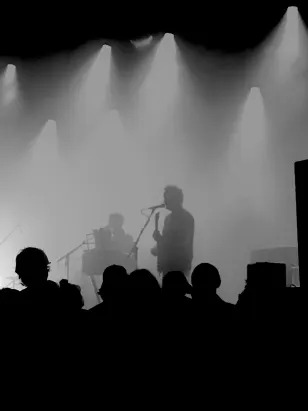A longer one today, but I couldn’t justify making it a whole essay. I saw Mount Eerie in concert yesterday and bought his book and it has been really inspiring. I could write a lot more, but the music speaks for itself. Listen to Night Palace!
There are two worlds in Phil Elverum’s Night Palace: A deeply troubled human world, on land stolen, divvied up, and sold. And an ancient world that’s far too powerful, too beautifully steadfast to care about human troubles.
While both these worlds are poignant in theory, the reality is this (And Mr. Elverum isn’t shy about it): We can’t live in one and not the other.
The album is like a story of little stories about his personal experience in this place between worlds. The haunting lines of the title track: “I saw flashing - I saw plumes of smoke - I put the kids to bed - I wash dishes in the night.” Even with the world falling down around us, we still must live our lives. The imagery of woods and fire in this album is especially touching: Our forests are regularly smoldering, proving how the two worlds intersect when left unchecked.
Perspectives in the stories are both from a traveler and a home-owner.
The mystical, natural elements of Night Palace are like the tales of sights seen and sounds heard on a long adventure in the woods: “I Walk, “I Heard Whales,” “I Saw Another Bird,” “I Spoke With A Fish.” For me, the prevailing image is a wanderer in the far corners of the Pacific Northwest, in itself a far corner of a wide and beautiful world.
Night Palace’s little stories are sometimes stamped with a location. I imagine it’s where they were written. This gives credence to the traveling themes, as these locations paint Mr. Elverum as a wanderer himself. And aren’t we all? “But for now I pass across the land - like everyone, a piece of wind, a little confluence - only the occurrence of a person.”
Owning land is another key perspective. “November Rain” illustrates this reality which bridges worlds: So much of the Northwest is sacrificed to homes with the square footage of football fields, and lights which drown out all the natural dark. All the while, this ignorant lifestyle is only possible because of made-in-America genocide.
Criticism of ownership isn’t just Mr. Elverum calling out Puget Sound billionaires. He himself owns land. The song “Co-Owner of Trees” he has described as a self-own, putting himself in place. So what he makes money playing guitar? How does that entitle him to own a place? It’s totally revealing of our country’s belief system. Ownership can be bought and sold with only a signature on a paper.
Blow it up, burn it down, or dig up all the soil in and replace it with concrete-- The freedom is yours.
“Non-Metaphorical Decolonization” is where things get the most literal. Nothing can be owned. America’s colonization and racist poison proves it must die. The bridge between worlds is fully gapped. And there’s no way to mistake the message for this new world-- America is a failed state in its twilight years, waiting for the right moment to drop dead.
But not before spitting as much poison as possible.
It’s a hard time to live happily today, and Mr. Elverum addresses the problem squarely: We’re facing an hour in which even the mystical, the green, the beautiful things are at stake.
P.S.
Worth mentioning is how the homes of many of these songs are stamped with the ethos of “Non-Metaphorical Decolonization:” “Ch’x’ení.” “Sx’á7lex’.” You probably won’t understand them, but that’s the point. It’s telling of America’s erasure of the past.

